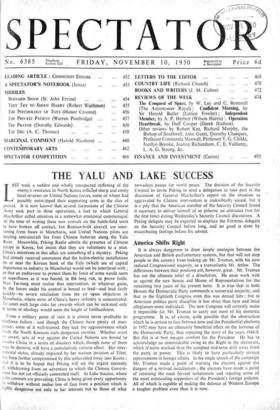America Shifts Right
It is always dangerous to draw simple analogies between the American and British parliamentary systems, but that will not stop people in this country from looking on Mr. Truman, with his now reduced Congressional majority, as a transatlantic Mr. Attlee. The differences between their positions are, however, great. Mr. Truman has not the ultimate relief of a dissolution. He must work with or against the new Senate and House of Representatives for the remaining two years of his present term. It is true that in both Houses the Democratic Party commands a numerical majority, and that in the Eightieth Congress even this was denied him ; but in American politics party discipline is less strict than here and local allegiances more individual. The new Congress will certainly make it impossible for Mr. Truman to carry out most of his domestic programme. It is, of course, quite possible that the obstruction which he is certain to face between now and the Presidential elections in 1952 may have an ultimately beneficial effect on the fortunes of the Democratic Party, thus repeating the story of the years 1946-8. But this is at best meagre comfort for the President. He has to acknowledge an unmistakable swing to the Right in the electorate, which is' more marked than the accepted mid-term drift away from the party in power. This is likely to have particularly serious repercussions in foreign affairs. In his single speech of the campaign Mr. Truman made a point of warning the electors against the dangers of a, revived isolationism; the electors have made a point of returning the most fervent isolationists and rejecting some of the most outstanding supporters of the President's foreign policies. All of which is capable of making the defence of Western Europe a tougher problem even than it is now.


















































